The 100th anniversary of the First World War is now finished but the records will continue to be preserved at the Archives and accessible to current and future generations who want to know more about the time period. In addition, this blog will remain on our website as an additional resource.
September 2018 Posts:
- 24 September: The S.S. Pelican Part 2: “…steaming at utmost speed”
- 17 September: “We are winning the war at the front but not at home these days”
- 10 September: War correspondent J. F. B. Livesay documents Canada's 100 days
- 4 September: Rumours of Captain Boswell's death reach Souris
24 September 2018
Our 20 November 2017 blog introduced the Hudson’s Bay Company’s ship S.S. Pelican. On 26 August 1918, the Pelican became engaged in combat. That day, the ship steamed towards Cardiff. The transatlantic trip had been smooth since leaving Montreal two weeks earlier. However, this all changed at 2:57 PM when a German submarine fired 21 rounds at the Pelican.
Chief Officer, Fred Coe, recorded the events in the ship’s log book.
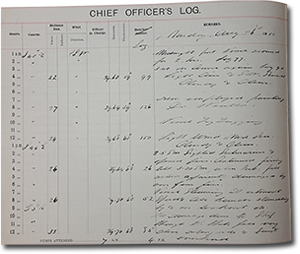
“2.5 PM Sighted Submarine and opened fire. Continued firing till 3.30 PM, when sub: fell astern apparently damaged by our gun fire. Vessel steaming at utmost speed and all hands standing by and on lookout. No damage done to ship”
The Pelican, miraculously undamaged, arrived safely in Cardiff and news of the ship’s encounter quickly travelled to the Admiralty. On 28 Sept. 1918, the Admiralty informed the Hudson’s Bay Company that Captain Arthur Borras and gunner James Henry Hill (Acting Lance Corporal for the Royal Marines Light Infantry) were to be “commended” in the London Gazette.
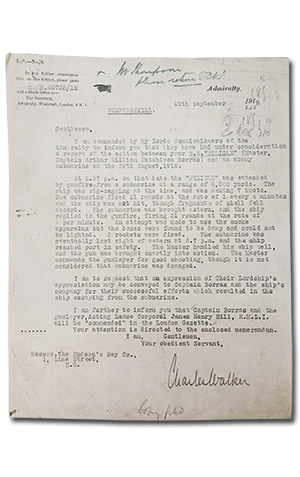
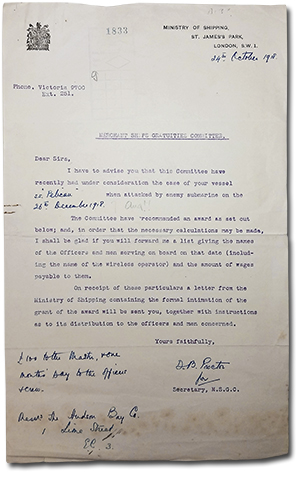
Recognition for the crew of the Pelican continued to come in. On 24 October 1918, the Merchant Ships Gratuities Committee recommended that the Ministry of Shipping give an award to the Pelican’s officers and crew. Captain Borras received 100 pounds and the officers and crew were awarded one month’s salary.
Search Tip: Search “Pelican” in Keystone to find more records about the ship.
Feedback
E-mail us at archiveswebmaster@gov.mb.ca with a comment about this blog post. Your comments may be included on this page.
17 September 2018
“We are winning the war at the front but not at home these days”
Jack Quelch was serving with the 44th Battalion when he suffered a gunshot wound in battle in the summer of 1918 and was transferred to England to recuperate. He wrote letters to his family in Beulah, Manitoba describing his experience in England, and providing details about his wounds. Quelch wrote about his views on the labour unrest he saw and read about in a letter to his mother on September 26 from Bristol, England.
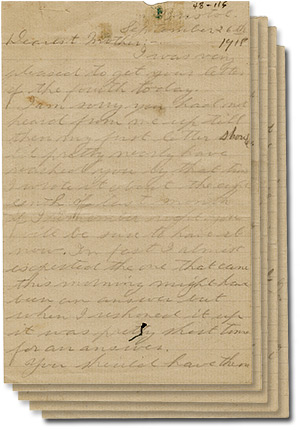
(5 images)
We are winning the war at the front but not at home these days. What do you think of this strike. It will not be necessary for me to express my opinion of them here. After spending two years in France to come back and see an exhibition like this “Well” it would give a man a pain. The Labor Leader Thomas certainly gave them the right goods and resigned into the bargain. I was reading his speech in the paper today.
I saw them holding a big mass meeting in Fishponds park last night when I was coming home in the train. I would like to have seen old Fritzy drop a bomb on the lot.
Quelch also provided further information about the events that occurred after he was wounded.
You asked me how long I had to stay in the line etc after I was hit. I was able to walk out with aid of one of the chaps. Owing to my leg and loss of blood I wasn’t able to go very far by my self. I had to beat it as fast as I could for a couple of hundred yards after I got hit as he turned a machine gun up the road. I lay [in] the remains of an old cellar for a few hours and old Fritz peppered round it pretty lively with his five mines in fact he hit it but not the part I was in. Then I tried to make it out with two runners that were going. But we only got about half a mile it was pretty dark and we got tangled up in barbed wire entanglements. And not being able to use my leg much we hunted up a punk hole and camped till day light. Then we started out again and after about three hours made the first dressing station in a old ? about two miles out. It wasn’t till then I found how much l blood I had lost when he cut of my shirt tail and the front of my pants it was well soaked. Then I had to make another mile or so to the ambulance.
The collection of Quelch letters has been digitized and can be read online through the Archives’ Keystone database.
Quelch is one of several individuals featured in our hallway display. Visit the Archives of Manitoba to see this display or to see other records related to the First World War. We are located at 200 Vaughan Street in Winnipeg, and we are open Monday to Friday from 9 a.m. to 4 p.m.
Search Tip: All of Jack Quelch’s letters have been digitized and can be read online. Read Jack Quelch’s letters online by searching “Jack Winter Quelch” in Keystone.
Feedback
E-mail us at archiveswebmaster@gov.mb.ca with a comment about this blog post. Your comments may be included on this page.
10 September 2018
War correspondent J. F. B. Livesay documents Canada's 100 days
In August 1918, Winnipegger J. F. B. Livesay, travelled to France to report on the activities of the Canadian Corps during what would be the final months of the First World War. Livesay traveled with Canadian troops until the Armistice and reported from the Western Front. Copies of some of his articles, can be found in a scrapbook in the J. F. B. Livesay records.
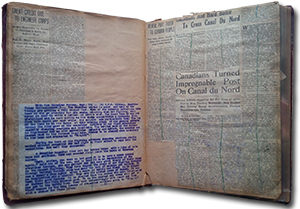
Prior to travelling to Europe, Livesay was manager of the Western Associated Press, and had helped found the Canadian Press Ltd. E. H. Macklin of the Manitoba Free Press had advocated for Livesay's appointment as war correspondent since 1914, when the possibility of sending a journalist to report on Canadian military activities from the frontlines was first raised.
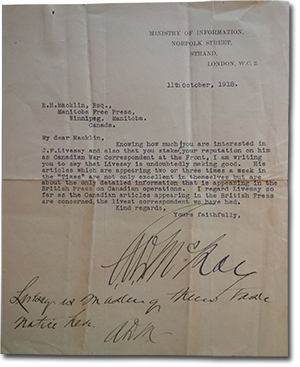
Macklin forwarded a letter to Livesay that he had received in October 1918 from General Alexander Duncan McRae, a Canadian officer with the Ministry of Information in London, praising Livesay’s reports from the front:
“Knowing how much you are interested in J. F. Livesay and also that you staked your reputation on him as Canadian War Correspondent at the Front, I am writing you to say that Livesay is undoubtedly making good. His articles which are appearing two or three times a week in the “Times” are not only excellent in themselves but are about the only detailed information that is appearing in the British Press on Canadian operation. I regard Livesay so far as the Canadian articles appearing in the British Press are concerned, the livest correspondent we have had.”
In a postscript McRae adds:
“Livesay is making them take notice here.”
Following the war, Livesay published a book based on his work as a war correspondent entitled “Canada's Hundred Days: With the Canadian Corps From Amiens to Mons, Aug 8 Nov, Nov, 11, 1918”. In 1920 Livesay and his wife, writer Florence Randall Livesay, and daughters, Dorothy and Sophie, moved to Toronto where he took up the position of general manager of the Canadian Press.
Search Tip: Search “Livesay” in Keystone to find out more about J. F. B. Livesay.
Feedback
E-mail us at archiveswebmaster@gov.mb.ca with a comment about this blog post. Your comments may be included on this page.
4 September 2018
Rumours of Captain Boswell's death reach Souris
In April 2018, we wrote about Captain Clarence Boswell of Souris, Manitoba and his younger brother John who were serving in France. In a letter to his mother dated 2 September 1918, Clarence wrote to tell her about being injured in battle on the 30th of August.
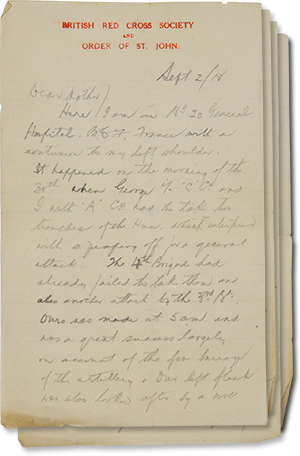
(4 images)
“Here I am in No 20 General Hospital B. E. F. France with a contusion to my left shoulder. It happened on the morning of the 30th when George F “C” Co and I with “A” Co had to take two trenches of the Hun, which interfered with a jumping off for a general attack. The 4th Brigade had already failed to take them and also another attack by the 3rd Bn. Ours was made at 5 am and was a great success largely on account of the fine barrage of the artillery. Our left flank was also looked after by a well known British Bn. Our casualties were comparatively light but included George. Davidson & one of the officers engaged. I didn’t know that Davidson was hit until he turned up on the next bed but one to me in the C.C.S. He had two machine gun wounds in his leg.
My injury is fairly slight but when the piece of shell landed on my shoulder and knocked me down I thought it was a house. Fortunately I had my pack on my back and I think that saved me. As it is there are no bones broken neither is the flesh but it is swollen and stiff. I spent one night in C.C.S. No 1 and am now at No 20 General Hospital. We get the best of attention.”
Interestingly, there is another letter in this collection which describes the reaction in Souris, Manitoba to rumours of Boswell’s death resulting from an error in the newspaper casualty lists. Boswell’s friend Samuel H. Forrest explains in a letter dated 8 September 1918:
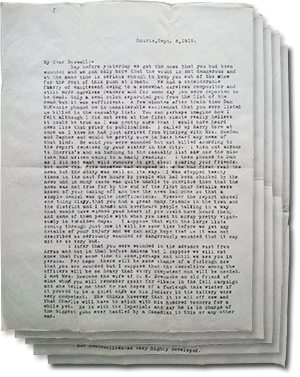
(5 images)
“We had a considerable flurry of excitement owing to a somewhat careless compositor and still more careless readers and for some day you were reported to be dead. Only a semi colon separated you from the list of the dead but it was sufficient.”
The news spread through town that Boswell had been killed:
“I was stopped twenty times in the next few hours by people who had been shocked by the news and in many cases was quite unable to convince them that the news was not true for by the end of the first hour details were known of your taking off and hot the news had come so that a simple denial was quite inefficacious. However the report showed one thing clearly, that you had a great many friends in the town and the district and I heard and overheard people talking in a way that would have warmed your heart if you could have heard them; and some of them people with whom you used to scrap pretty vigorously in the olden days.”
Clarence Boswell recovered from his wounds and went on to serve in Germany before he returned to Manitoba. Boswell is one of several individuals featured in our hallway display. Visit the Archives of Manitoba to see this display or to see other records related to the First World War. We are located at 200 Vaughan Street in Winnipeg, and we are open Monday to Friday from 9 a.m. to 4 p.m.
Search Tip: Search “Boswell” in Keystone to find out more about Boswell and his First World War letters.
Feedback
E-mail us at archiveswebmaster@gov.mb.ca with a comment about this blog post. Your comments may be included on this page.



